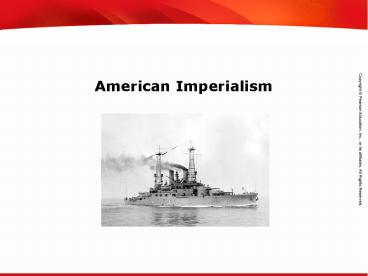American Imperialism - PowerPoint PPT Presentation
Title:
American Imperialism
Description:
In The Influence of Sea Power Upon History, historian Alfred T. Mahan argued that many great nations owed their greatness to naval power. – PowerPoint PPT presentation
Number of Views:145
Avg rating:3.0/5.0
Title: American Imperialism
1
American Imperialism
2
Objectives
- Identify the key factors that prodded America to
expand. - Explain how the United States took its first
steps toward increased global power. - Summarize the chain of events leading up to the
U.S. annexation of Hawaii.
3
Terms and People
- imperialism policy by which stronger nations
extend their political, economic, and military,
control over weaker territories - extractive economy colonial economies based on
an imperialist nation extracting, or removing,
raw materials - Alfred T. Mahan naval historian who advocated
for naval power as the basis for a great nation
urged the United States to build a modern fleet
4
Terms and People (continued)
- Social Darwinism - belief that Darwins theory of
the survival of the fittest should be applied to
societies, justifying imperialism - Frederick J. Turner historian who noted the
closure of the American frontier his ideas were
used by others to urge U.S. overseas expansion - Matthew Perry U.S. naval commander who sailed a
fleet into Tokyo Bay in 1853 and opened trade
with Japan
5
Terms and People (continued)
- Queen Liliuokalani Hawaiian monarch dethroned
in 1893 by rebel American planters in an action
backed by U.S. Marines
6
How and why did the United States take a more
active role in world affairs?
For most of its early history, the United States
played a small role in world affairs. But in the
late 1800s, some began calling for the United
States to join the ranks of the worlds major
powers. Eventually, the United States abandoned
isolationism and began to acquire influence and
territories outside its continental borders.
7
- Powerful European nations extended their
political, economic, and military influence by
adding colonies in Africa and Asia. - Meanwhile, the United States and Japan considered
the benefits and implemented similar imperialist
policies.
The mid-1800s through the early 1900s was an Age
of Imperialism.
8
Imperialist nations looked for economic benefits.
Colonial extractive economies were based on
removing raw materials from colonies and taking
them back to the home country. European nations
and Japan used this strategy.
The United States had raw materials, but not
enough of a market to consume all the goods the
they produced. American industrialists sought new
overseas markets for their manufactured and
agricultural products.
9
In The Influence of Sea Power Upon History,
historian Alfred T. Mahan argued that many great
nations owed their greatness to naval power.
He urged construction of a fleet of steel ships,
acquisition of overseas bases, and construction
of a canal across Central America. The United
States eventually followed all of his
recommendations.
10
Imperialists justified their actions based on
beliefs about their own racial, national, and
cultural superiority.
Social Darwinism was the belief that life
consists of competitive struggles in which only
the fittest survive. Social Darwinists felt that
certain nations and races were superior to others
and were therefore destined to rule over the
inferior people. Americans embraced Social
Darwinism because they had long believed that God
had granted them the right to settle the
frontier. They spoke of their Manifest Destiny.
11
Historian Frederick Jackson Turner argued that
the frontier served as a safety valve,
siphoning off potential discontent in the United
States.
Turners followers urged overseas expansion as
Americas next frontier to avert future
discontent in the United States.
12
In 1867, Secretary of State William Seward
purchased Alaska from Russia for 7.2 million.
- Critics mocked Sewards Icebox and Sewards
Folly as a far off and useless frozen tundra. - But valuable resources, including timber, and
oil, were found. - Alaska also doubled Americas territory.
13
- In the 1790s, Americans planters established
sugar cane plantations in Hawaii. - In 1887, these planters gained control of the
government from King Kalakaua. - In 1891 the king died and his sister became Queen
Liliuokalani. She resented the power of the white
minority and abolished the constitution that had
given them political power. - In 1893, with the help of U.S. Marines, the Queen
was dethroned. - In 1897, President McKinley backed annexation
when he took office.
In 1898, Congress voted to annex Hawaii.
14
The United States expanded overseas after 1850.
Commodore Matthew Perrys fleet entered Tokyo
Bay, persuading Japan to trade with the United
States.
1853
1867
1867
1898
1898
Secretary of State William Seward purchased
Alaska from Russia.
The United States obtained Midway Islands in the
Pacific.
Congress approved the annexation of Hawaii.
The Spanish-American War gave the U.S. control of
the Philippines, Puerto Rico, and Guam.
15
(No Transcript)































![get⚡[PDF]❤ Eco-Imperialism: Green Power Black Death PowerPoint PPT Presentation](https://s3.amazonaws.com/images.powershow.com/10051480.th0.jpg?_=20240610127)